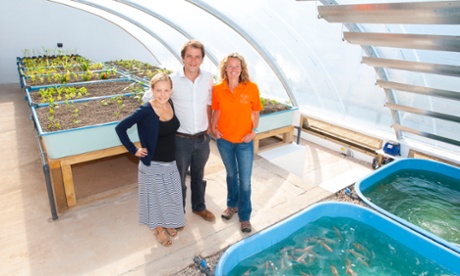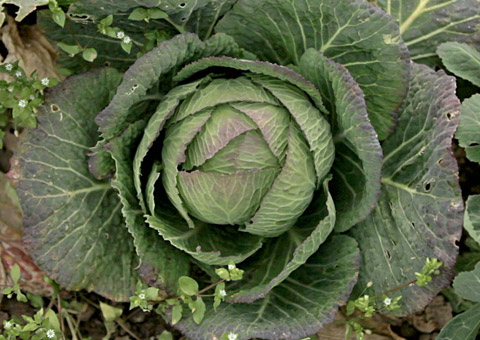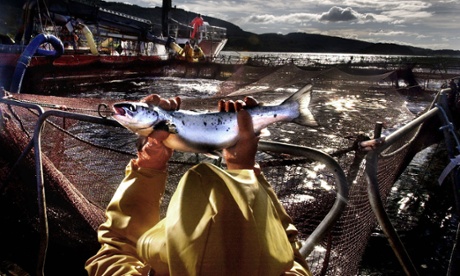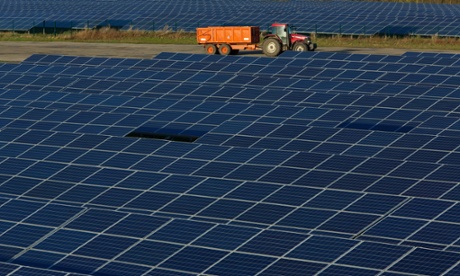A collective "ooh" went up as the condensation cleared from a new 12 x 7 metre structure to reveal the UK's first aquaponic solar greenhouse, in the perhaps unlikely environs of Kate Humble's 117-acre ex-council farm in Monmouthshire, Wales.
This is a greenhouse with a surprising wow factor. Inside, you can make out the blue of the fish tanks containing male tilapia (a species chosen as they grow rapidly to harvest size and as one of yesterday's visitors put it "taste lovely on a barbecue") and the raised beds full of fledgling vegetable crops. Of course, there is also much that you can't see – which is rather the point with a closed-loop food production system that needs little interference; the vegetable beds fill and drain, twice an hour, sustained by nutrient-rich water from the fish tanks.
That this breakthrough technology with implications for the nation's diet is all going on on a little farm in Monmouthshire rather than in an agricultural science institution might seem incongruous, but that has everything to do with the tenacity of the farm's owner, TV presenter Kate Humble. When the Guardian visited her back in April it was clear she believes wholeheartedly in the regeneration of small-scale farming, and the company, Humble by Nature, she runs from this working farm, hosts courses that range from dry stone walling to keeping pigs designed for people to "leave filthy, exhausted and with their clothing completely ruined".
Three years ago this farm was about to be broken up and sold on because 117 acres was considered too small to be useful or profitable. Humble was determined that a farm of this size should and could work, and became convinced that the science of aquaponics was key. Determination seems to have been turned into a type of rocket fuel when she got angry – always a powerful motivating force. "I was listening one morning to the BBC Radio 4 Today programme and I heard an interview with someone from a food bank scheme in Moreton-in-the-Marsh. He said something to the effect of: 'It's all very well being surrounded by pretty green fields, but that doesn't produce food.' I thought 'What the hell is going on?'"
She is not alone in asking herself that question and nor in her disgust that we increasingly view rural populations as unable or unwilling to grow food. Fortunately she discovered across scientists Charlie Price and Becky Bainbridge of social enterprise, Aquaponics UK, who are devoted to growing more food in less space. "We wanted to create a model to produce food in a low input way," explains Price, who is also an expert in biomass energy, "but to do so in a building that required very little energy. Ultimately it's nothing new, it's a combination of existing technologies put together in a structure."
In many ways it's about taking the heat out of the energy, water and oil requirements that dog conventional agriculture and even aquaculture and hydroponics. As Humble explains it: "You’ve got your fish in your tanks, tilapia – which do well in aquaculture - shitting away merrily, and that water full of nitrates is pumped through vegetable beds. The leafy greens love the nitrates and grow like fury, the vegetables clean the water and back it goes to the fish."
In terms of energy, the passive thermal structure, with a thermal mass wall, captures and stores as much solar energy as possible, and then releases it into the greenhouse at night. It requires very little supplementary heating (it also wears a special thermal quilt at night). In essence this mimics the airflow of a termite mound, in a nod to biomimicry.
Feeding is also self-sustaining: the fish are fed primarily on worms from the wormeries at the back of the structure (which also supply worm tea, used as a pest preventative as a spray on the plants in the beds) but also from black soldier flies. Whereas conventional aquaculture often falls down on sustainability by the consumption of fish food from wild caught fish, the black soldier flies here eat until they pupate, then self-harvest with the aid of a cleverly positioned ramp and become fish food. And this is a completely organic system (there are no petroleum-based pesticides). In a naturally balanced system, pest control is left to species who do it naturally, and techniques such as companion planting. 'We even tried chameleons to eat pests,' says Becky Bainbridge, 'but in fact they just ate everything, even the good pests.' Now they leave it to ladybirds to deal with aphids.
In terms of yield, even this 'smallholder scale' trial hub promises much. Based on German trials, it could soon be producing between 30 and 35 kgs of fruit and vegetables a week and 200 kgs of fish a year, more than enough to supply the restaurant and cafe on site, redefining local food. The massive boon for aquaponics is of course the extended growing season it offers; despite lecturing that we must eat in season, there seems little appetite to adjust our diet accordingly. Aquaponics, in theory offers us a chance to have our bananas and eat them (all year around).
Could aquaponics, the marriage of hydroponics (cultivating plants in water) and aquaculture (the farming of aquatic organisms) be key to boosting our food self-sufficiency and our resilience to overseas price hikes? We do need some answers. A recent University of Cambridge report tells us at the moment we're running a food, feed and drink deficit of £18.6bn. By 2030 there will be 70 million of us on these shores and the researchers tell us we'll face a 2m hectare shortfall in productive land needed to produce food.
What's amazing given its potential is that aquaponics has been given so little air time. You are more likely to find United Nations FAO reports and symposiums on raising insects for the table (an interesting idea but with huge societal cultural barriers in western Europe) than a food system like this which addresses the challenges of energy in food production head on in closed-loop system. "The reality is agriculture since the green revolution has been focused on monocrops," explains Price, "and putting a lot of energy into the individual crop and tailoring chemicals to make that crop as productive as possible. By contrast this is an integrated, multi-trophic ecosystem. It requires a shift in thinking. There's value in that but also it's complicated. For example if you're doing all sorts of things – raising insects for food, and different crops and species all under one system, who do you go to for funding?"
In this case to the Welsh government who have funded the project to the tune of £200,000 through the Federation of City Farms and Community Gardens, an organisation trained on "reinventing common sense agriculture" and through their flagship Welsh project Tyfu Pobl (Growing People). As well as training up some of their communities in aquaponics at Humble by Nature they'll be looking to harvest a lot of data. Essentially what they and everybody wants to know is whether this is replicable for communities up and down the land. As we speak a proposal for a solar aquaponic greenhouse 20 times as large as this one is being considered for planning in West Sussex. Is it time for aquaponics to have its moment in the sun?
Interested in finding out more about how you can live better? Take a look at this month's Live Better challenge here.
The Live Better Challenge is funded by Unilever; its focus is sustainable living. All content is editorially independent except for pieces labelled advertisement feature. Find out more here.











